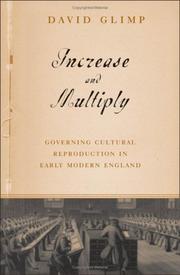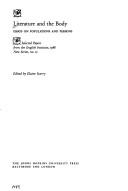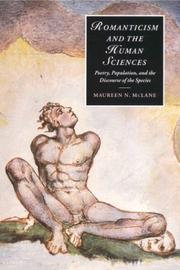| Listing 1 - 7 of 7 |
Sort by
|
Book
Year: 1983 Publisher: Standford (Calif.): Anma Libri,
Abstract | Keywords | Export | Availability | Bookmark
 Loading...
Loading...Choose an application
- Reference Manager
- EndNote
- RefWorks (Direct export to RefWorks)

ISBN: 0816639906 0816639914 0816693919 Year: 2003 Publisher: Minneapolis University of Minnesota Press
Abstract | Keywords | Export | Availability | Bookmark
 Loading...
Loading...Choose an application
- Reference Manager
- EndNote
- RefWorks (Direct export to RefWorks)
Demography --- English literature --- Population in literature. --- History --- History and criticism

ISBN: 0801836042 Year: 1988 Publisher: Baltimore (Md.) : Johns Hopkins university press,
Abstract | Keywords | Export | Availability | Bookmark
 Loading...
Loading...Choose an application
- Reference Manager
- EndNote
- RefWorks (Direct export to RefWorks)
Book
ISBN: 1108989713 1108996000 1108996094 1108839274 Year: 2021 Publisher: Cambridge : Cambridge University Press,
Abstract | Keywords | Export | Availability | Bookmark
 Loading...
Loading...Choose an application
- Reference Manager
- EndNote
- RefWorks (Direct export to RefWorks)
The novel since the nineteenth century has displayed a thorny ambivalence toward the question of having children. In its representation of human vitality it can seem to promote the giving of life, but again and again it betrays a nagging doubt about the moral implications of procreation. The Novel and the Problem of New Life identifies this tension as a defining quality of the modern British and European novel. Beginning with the procreative-skeptical writings of Flaubert, Butler, and Hardy, then turning to the high modernist work of Lawrence, Woolf, and Huxley, and culminating in the postwar fiction of Lessing and others, this book chronicles the history of the novel as it came to accommodate greater misgivings about the morality of reproduction. This is the first study to examine in literature a problem that has long troubled philosophers, environmental thinkers, and so many people in everyday life.
European fiction --- Childbirth in literature. --- Children in literature. --- History and criticism. --- Childhood in literature --- Children in poetry --- English fiction --- Population in literature. --- History and criticism
Book
ISBN: 9781501710704 1501710702 1501710710 1501710729 9781501710728 9781501710711 1501761714 Year: 2018 Publisher: Ithaca, NY
Abstract | Keywords | Export | Availability | Bookmark
 Loading...
Loading...Choose an application
- Reference Manager
- EndNote
- RefWorks (Direct export to RefWorks)
From the teeming streets of Dickens's London to the households of domestic fiction, nineteenth-century British writers constructed worlds crammed beyond capacity with human life. In 'Populating the Novel', Emily Steinlight contends that rather than simply reflecting demographic growth, such pervasive literary crowding contributed to a seismic shift in British political thought. She shows how the nineteenth-century novel in particular claimed a new cultural role as it took on the task of narrating human aggregation at a moment when the Malthusian specter of surplus population suddenly and quite unexpectedly became a central premise of modern politics. In readings of novels by Mary Shelley, Elizabeth Gaskell, Charles Dickens, Mary Braddon, Thomas Hardy and Joseph Conrad that link fiction and biopolitics, Steinlight brings the crowds that pervade nineteenth-century fiction into the foreground.
English fiction --- Population in literature --- Fertility, Human, in literature --- Malthusianism --- History and criticism --- Malthusianism. --- Fertility, Human, in literature. --- Population in literature. --- Eugenics --- Population --- History and criticism. --- population in nineteenth century literature, Victorian biopolitics, Victorian fiction and the masses, the nineteenth century British novel and demography, Malthus and literature.
Book
ISBN: 9780812252026 Year: 2020 Publisher: Philadelphia : University of Pennsylvania Press,
Abstract | Keywords | Export | Availability | Bookmark
 Loading...
Loading...Choose an application
- Reference Manager
- EndNote
- RefWorks (Direct export to RefWorks)
"This book discusses human mobility from Milton to Malthus. Each chapter of focuses on a group of subjects vulnerable to coerced mobility: the landless poor (Chapter 1); the native Irish (Chapter 2); army veterans (Chapter 3); the rural poor displaced by enclosure (Chapter 4); the Scots (Chapter 5); humanity imagined under the pressure of pandemic (Chapter 6); and the poor again under the new Poor Laws of the 1830s (Chapter 7). The first two chapters provide complementary accounts of the intersection between population and mobility: the first focusing on legal and economic policy toward the poor in relation to Milton's Paradise Lost; the second on the emergent science of political arithmetic as critiqued by Swift in his writing about Ireland. The first focuses on people, the second on numbering. These two chapters, plus a third, make up the first conceptual half of the book. They look at the concern prevalent from the Restoration to the mid-eighteenth century, triggered by the seeming superfluity of British population, to find a way for persons thought useless to the state-the poor, the Irish, and army veterans-to become useful again, usually by deploying them to "vacant" colonial spaces. The next three chapters, centered on Goldsmith's The Deserted Village, Scott's The Heart of Midlothian, and Shelley's The Last Man, examine the shift in the second half of the eighteenth century to anxiety about depopulation and the effect of disease, murder, and dispossession on England's sense of its identity in relation to its empire. Finally, the book turns to the work of Thomas Malthus, positioning it as an epistemological watershed as it reconceptualized peopling as a problem of time rather than space-a problem of futurity rather than territory"--
Auswanderung --- Bevölkerung --- British colonies. --- Emigration and immigration in literature. --- Emigration and immigration. --- English literature --- English literature. --- Mobilität. --- Population in literature. --- Population. --- History and criticism --- 1700-1799. --- Great Britain --- Great Britain. --- Gro�britannien. --- Colonies --- History --- Emigration and immigration --- Population

ISBN: 0521773482 0511310501 0511151144 128015473X 0511049943 0511484399 0511118511 1107119901 0511010842 9780511010842 0511034695 9780511034695 9780511118517 9780521773485 9780511484391 9780511049941 9780511151149 9781280154737 9780521028202 0521028205 Year: 2000 Publisher: Cambridge [England] ; New York : Cambridge University Press,
Abstract | Keywords | Export | Availability | Bookmark
 Loading...
Loading...Choose an application
- Reference Manager
- EndNote
- RefWorks (Direct export to RefWorks)
This study, published in 2000, examines the dialogue between Romantic poetry and the human sciences of the period. Maureen McLane reveals how Romantic writers participated in a new-found consciousness of human beings as a species, by analysing their work in relation to discourses on moral philosophy, political economy and anthropology. Writers such as Wordsworth, Coleridge, Mary Shelley and Percy Shelley explored the possibilities and limits of human being, language and hope. They engaged with the work of theorisers of the human sciences - Malthus, Godwin and Burke among them. The book offers original readings of canonical works, including Lyrical Ballads, Frankenstein and Prometheus Unbound, to show how the Romantics internalised and transformed ideas about the imagination, perfectibility, immortality and population which so energised contemporary moral and political debates. McLane provides a defence of poetry in both Romantic and contemporary theoretical terms, reformulating the predicament of Romanticism in general and poetry in particular.
English literature. --- English literature - 19th century - History and cr. --- Literature and anthropology. --- Literature and society. --- Population in literature. --- Romanticism. --- Social problems in literature. --- Social sciences. --- English literature --- Literature and society --- Literature and anthropology --- Social sciences --- Social problems in literature --- Romanticism --- Population in literature --- English Literature --- English --- Languages & Literatures --- History and criticism --- History --- History and criticism. --- Behavioral sciences --- Human sciences --- Sciences, Social --- Social science --- Social studies --- Anthropology and literature --- Civilization --- Anthropology --- Arts and Humanities --- Literature
| Listing 1 - 7 of 7 |
Sort by
|

 Search
Search Feedback
Feedback About UniCat
About UniCat  Help
Help News
News